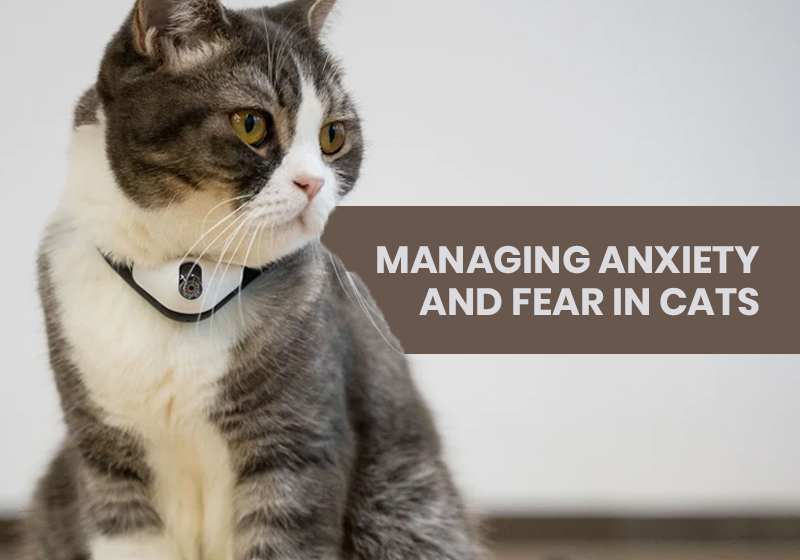Anxiety is defined as a feeling of nervousness, causing discomfort and fear from stimuli. Humans, in general, experience anxiety in their day-to-day lives. The same kinds of fear and discomfort can also be felt by cats. When a cat senses danger or a threat, it experiences anxiety, which can lead to odd behavior.
According to research, cats get anxious due to trauma or a specific stimulus. Changes in the house, noises from the surroundings, or even the addition of a new family member can cause your cat to become anxious. For instance, if your cat is showing signs such as increased respiratory and heart rates, panting, trembling, etc., or changes like hiding, increased movement, excessive vocalization, or irritation, then it might be suffering from anxiety.
This blog will enlist some common symptoms and causes of cat anxiety and fear as well as the ways in which you can manage it.

How to Know If Your Cat Has Anxiety or Fear?
There are numerous ways in which your cat may show signs of fear and anxiety, which might not always be visible and noticeable. Closely observing your cat’s behavior and daily activities can give you a hint of whether your cat is anxious or not. One can observe their felines for the following common signs of anxiety:
- Aggression and irritated behavior
- Excessive grooming
- Sudden clinginess to the human parent
- Partially dilation of pupils
- Urinating outside the litter box
- Keeping their tails close to the body
- Slight tail flicking
What Causes Cat Anxiety?
Cats can be very sensitive to changes in their environment and thus the slightest change in their house or routine can cause stress to them. Apart from this, the addition of a new family member or unfamiliar guests may trigger your cat. Stress can also be the result of trauma in the early years of life, genes, or separation.
Interestingly, these symptoms are similar to that of what causes anxiety in humans. So if you are going through a major life change and are stressed about it, then it would in ways affect your kitty too. A few causes of cat anxiety are-
- Separation anxiety
- Abused in the past
- Traumatic events that disrupted your cat’s mental state
- Changes in the environment like redecorating the house or relocating to an unfamiliar place
- Adding/losing a family member
- Lack of socialization in the early years of their life
How to Manage Anxiety and Fear in Your Cat?
Each cat requires a unique course of action to overcome anxiety. Before you find a technique that works for you and your furry buddy, it could take some time and can be chosen by trial and error because what works for one cat might not work for another.
Treatment for cat anxiety can be decided by combining several strategies, such as improving their habitat and seeking medical help. Additionally, it’s crucial to take care of any underlying medical conditions first, since these can be the source of your cat’s anxiety.
There are many products that can be used to relieve anxiety and fear in your feline baby-
- Scullcap and Valerian Tablets for cats– This is a herbal supplement for pets that help to control stress and anxiety and helps them stay focused. It contains Valerian and Mistletoe which aid in supporting the natural calming pathways and other compounds like Scullcap and Gentain reduce anxiety.
- Anxitane (L-Theanine) Chewable Tablets for Cats– These tablets are specially designed to help cats overcome nervousness and anxiety. It allows your cat to remain calm and relaxed.
- Sentry Calming Spray for Cats- This is a calming solution that needs to be sprayed on areas where your cat spends more time/ visits frequently. It helps to comfort your cat and reduce symptomatic aggression, clawing, and being anti-social. It contains lavender and chamomile fragrance that provides a soothing effect on cats, allowing them to feel calm and relaxed.
- HomeoPet Feline Anxiety Relief for Cats– It helps to relieve your pet from stressful situations such as separation anxiety, loud noises, traveling, etc. This homeopathic product can be used to alleviate anxiety and calm your pet.
- Anxiety TFLN– It helps to calm fearful pets during thunderstorms, firecrackers, windstorms, and loud noises. This homeopathic treatment relieves anxiety and works quickly with non-sedative and non-addictive effects.
- Favorite treats- One such calming agent that works on all animals equally is food. Giving your cat their favorite treats can help them calm down and make them happy. They can be trained to maintain composure by offering them treats for good behavior against the stimulant.
End Note
Dealing with anxiety can be frustrating and overwhelming. Your cat is dependent on you to help them overcome their anxiety and fear. For your kitty, to live a happy and healthy life, it is necessary to provide them with the most suitable treatment for relieving their anxiety and fear. If you have to make changes in your pet’s routine or environment, take it slow. Make a slow transition in your pet’s life by providing familiar objects or spaces.
If your cat is scared and anxious, try petting them or using soft words to make them feel safe and comfortable. Never punish them for their anxious behavior, or it may make the situation worse. We, as humans, need someone to calm us down when we are scared or anxious; someone to comfort us. Similarly, you are all your feline baby has; therefore it is your duty to be there for them when they need you the most.
